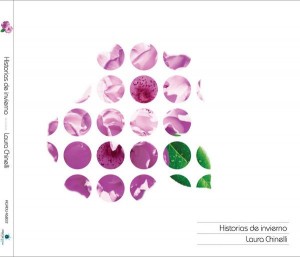
“Historias De Invierno” is Laura Chinelli's debut album. The band that recorded it included Fran Nasser, Nicolás Demczylo and Álvaro Barneche.
Is there life before love? Is there a time that exists outside of the prolongation of single moments that come to define us sentimentally? Or must we all live slave to that prolongation of moments, as if caught in an emotional ebb and flow which means all that happens will be validated by what had once come to be, ever and ever again?
Laura Chinelli’s debut album is nestled between all these questions, in a point where eyes are wide open, but often can only stare straight into that night which is not darkness but the blinding light of conscience. The majority of the songs on the album (which has been suitably named “Historias De Invierno” [Winter Tales]) have the singer retracing her steps through bridges that are not even there any longer, or burning with the kind of aching fire that is forever starting and stopping.

Laura Chinelli
In more places than one, “Historias De Invierno” feels like a musical variation on Villiers de L’Isle-Adams’ “Axel” – a story where the memory of love can modify all the present layers of perception. On songs like “Si Me Pierdo” [If I Get Lost], characters can’t see each other any longer. But their reflections still live in their eyes, and will keep on being there in spite of that blinding light which tries to overcome their staying force.
Other songs such as “Debajo De La Lluvia” [In The Rain] are more direct and rueful, very similar in tone and message to the defeatism of a song like Richard Thompson’s “She Sang Angels To Rest”. Compare Laura’s “puedo no volver a ser, puedo no ver, puedo no creer” [I might never be again, never see, never believe] and “Y si hoy soy lo que soy, y si no tengo a donde ir, y si hoy pierdo la razón” [And what if today I’m what I’m not, what if I have nowhere to go, what if I lose my mind] to Richard’s “how do you fall when you have already fell for the best”.
Yet, there are also moments of sentimental victory. The deepest comes as the album is ending with the song “Llévame“ [Carry Me]:
Llévame en tu mente
Búscame en los paisajes que te gustan
Búscame entre la gente
Búscame también en la oscuridad
[Carry me in your mind
Look for me in that scenery you love
Look for me in the crowd
And also, look for me in the darkness]
Out of the 11 songs that are offered up on “Historias De Invierno”, “Llévame” is undoubtedly the biggest achievement. The song marries the sincerity and commitment which obviously defines what Laura does (and which is really out of discussion) with a compelling structural grasp, a fluent melody and a clean-cut arrangement. It is her best moment on the whole album. And it is the one where she gives her music the chance to get livelier.
Because musically, “Historias De Invierno” is mainly subdued. It sticks to the pop-folk sound of artists like Sara McLachlan – an approach that can wear thin far too easily. Leaving aside “Llévame“, the only time the tempo really gets any faster is on “A Través Del Tiempo” [Across Time], the closer the album comes to rock (and hence, the closer I can come to annoying my next door neighbors with it).
Yet, that’s no indictment at all on the production by Fran Nasser (son of Jorge Nasser, ex-frontman of Níquel and one of the most remarkable Uruguayan composers of our time). The work he did on the album is generally tasteful and balanced. The sequencers do only get in the way in “La Noche Más Fría” [The Coldest Night] and “Ciudades” [Cities], two songs that are noticeably uninvolving (and the latter is also inarticulate from a lyrical point of view).
But if there’s something that could never be faulted is how much of a cohesive statement “Historias De Invierno” is. Conceptually, the album holds itself together admirably well. And that is all the more remarkable because it is a debut album. Yet, I don’t know to which extent “Historias De Invierno” can be termed an enjoyable album. Most of its tracks make it resemble a movie such as The English Patient or Sweet November – a work comparable to an emotional wall that you can but slam yourself against. And that is not really something enjoyable, notwithstanding how necessary it is.
Yet, the true beauty of the album lies in how well it insinuates the invariable season cycle that will touch us all in turn, as announced in the lyrics of “Entre Las Rocas” [Between The Rocks]:
Yo buscando siempre ser un poco más feliz
Para que florezca la flor
Florecer al lado de tu cuerpo
Para que florezca en ti el amor
[And here I go, always trying to be a little happier
So that the flower can bloom
Bloom right besides your body
So that love will bloom in you]
There is life before love. And there will be life forever after. Seasons come, and seasons go. Winter comes. But winter also goes. And we remain, a little better and a little worse. But we remain. Captains of our souls. Mastering circumstances, learning to command our emotions. We remain.
You can listen to Laura Chinelli’s music on her MySpace profile.
